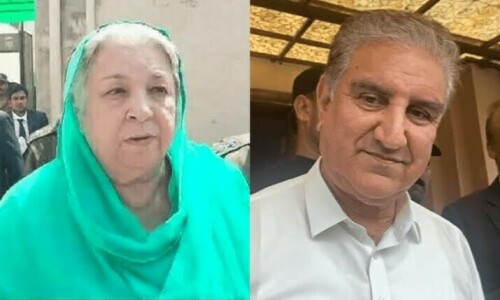LAHORE’S Ilqa Publications is to be commended on bringing out notable (and reasonably priced) short story collections over the course of the past year, including ones authored by Bapsi Sidhwa and Aamer Hussein. The short story genre, grossly underestimated in mainstream literary studies, generally suffers from a dearth of suitable publication venues, as compared to the novel form and arguably even poetry. This is nothing short of a pity, since the short story often reflects a seasoned writer’s greatest strengths, from the dual perspectives of both narrative pace and character. Rukhsana Ahmad’s collection, The Gatekeeper’s Wife and Other Stories, contains a dozen tales that are remarkable in their diversity; from both a thematic as well as structural point of view, no two are strictly alike.
The first story (from which the title of the collection derives its name) depicts the sentiments of an Englishwoman based in Lahore. Baffled by the manner in which a needy female domestic regularly steals meat from a normally ferocious cheetah’s cage, the Memsahib realises that there are some things about South Asian culture that she simply will never be able to fathom. Deprived, but not depraved, the servant claims that her bond with the animal resists logic, and it is Ahmad’s delineation of the universality of primal nature that lends the story its uniqueness. The author authentically portrays the predicaments of servants, a fact that is testified to by the sympathetic manner in which she approaches the subject in her second tale, ‘Appearances,’ and her final one, ‘A Day for Nuggo.’
Nuggo, a washerwoman married to a sweeper, depends on the charity of her employers for her humble abode within their compound. The struggle between her personal pride and the psychological prison within which she must operate is sensitively sketched by Ahmad, whose ability to endow the lives of the underprivileged with dignity is reminiscent of French naturalists, such as Balzac. In her third tale ‘Confessions and Lullabies,’ Ahmad focuses on the dire financial circumstances of an Indian lace-maker whose finely worked doily ends up gracing the table of an unhappy Englishwoman. This recurrent theme whereby the lives of women of divergent cultures and circumstances intersect also informs the story, ‘Through the Rose-Tinted Window.’ Ironically, this piece is perhaps the most cheerful of Ahmad’s tales, its central character a disturbed but harmless Englishwoman who finds unexpected moral support from a straitlaced Indian family residing in Britain.
While racial issues underpin much of the book, Ahmad wisely does not allow them to overrun the depth and momentum of her writing. Repressed psychological tensions, inexplicable dreams, and the female neuroses that stem from them frame the respective plots of ‘The Nightmare,’ ‘Cassandra and the Viaduct,’ and ‘My Daughter, Mona.’ Regardless of whether Ahmad’s character is a repressed housewife or a young woman coming of age, she discovers much about herself by the end of the tale.
A great deal of Ahmad’s success at being able to craft plausible plots comes from her talent at adapting plays for stage and radio at the international level. Lest the reader assume that Ahmad shies away from creating male protagonists, I will hasten to add that ‘Meeting the Sphinx’ centers on the figure of a die-hard male academic, who for all his brilliance cannot appreciate the nuances of human sentiment and need. Readers will be delighted by the bizarre nature of ‘Afterlife,’ a piece about a millionaire who proudly displays his most recent purchase (Einstein’s eyes) to an understandably overwhelmed call girl. Equally bizarre is ‘The Spell and the Ever-changing Moon,’ a haunting story about a domestically abused housewife who desperately turns to witchcraft in order to solve her marital problems. Ahmad’s book effectively runs the gamut of female emotions, from innocence to cruelty — a fact that is all the more remarkable given that this is a collection of stories, not an epic novel.
My personal favourite, ‘First Love,’ is perhaps the most ostensibly ordinary of the pieces and is written in the form of a young girl’s diary. Shah Bano (the central character) belongs to a relatively well-adjusted South Asian immigrant family based in Britain; her brother takes pride in serving in the RAF (Royal Air Force). While on duty, he is killed when he deliberately crashes his plane in order to prevent it from falling into the hands of the enemy. Even those unfamiliar with the heroic story of Rashid Minhas Shaheed will enjoy ‘First Love’; however, it will hold a special thematic and nationalistic significance for those readers who recognise the clever manner in which Ahmad has appropriated an historical account in order to enhance a modern tale. There is nothing pretentious or self-conscious about the manner in which her moral and pictorial messages are conveyed to the reader.
The reviewer is Assistant Professor of Social Sciences and Liberal Arts at the Institute of Business Administration.
The Gatekeeper’s Wife and Other Stories
(Short Stories)
By Rukhsana Ahmad
Ilqa Publications, Lahore
ISBN 978-969-9473-84-5
188pp.















































Dear visitor, the comments section is undergoing an overhaul and will return soon.